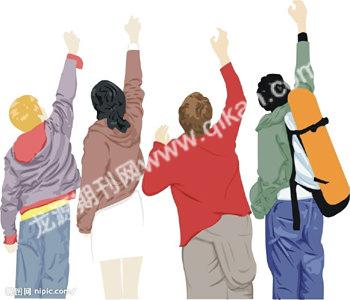穷游全中国
情景:乔和林芝在聊旅行时怎么省钱。

Joe: So, I hear you're going to Heilongjiang next month?
Lin Zhi: That's right! I'm really excited about it.
Joe: How come?
Lin Zhi: I've never been there before, you see, and I hear it's very beautiful.
Joe: I think so. I haven't been for ages, though. I want to travel more this year.
Lin Zhi: I only seem to get to travel on business trips at the moment. It isn't very fun. You just have to spend time seeing charts and factories and meeting with boring old businessmen or local officials, and having drinks and banquets. Rather boring. But in Harbin this time we have some free time in the middle, so that should be more interesting.
Joe: On the other hand, at least when you go on a business trip it's all expenses paid.
Lin Zhi: That's true. Though I don't think it's going to be like three years ago, when they sent us business-class and we stayed in the really nice hotels. Maybe only four-star, not five, this time.
Joe: I love flying business class - you feel a cut above everyone else - though of course I can't afford it when I'm travelling by myself. I'm going to have to travel on a tight budget this year, I think. I'm trying to save to buy property back home.
Lin Zhi: You want to buy now?
Joe: It's cheap - prices crashed. And I'd like to have the security of having a place. But, you know, it's much harder to get a good mortgage nowadays, so I have to put down a much bigger deposit.
Lin Zhi: I see.
Joe: So it's going to be tougher. I'm trying to save more of my salary, but I still want to travel.
Lin Zhi: You know, you can travel very cheaply in China if you're a little tough. I mean, when I used to go home in the holidays, it would only be two hundred kwai for a twelve hour trip.
Joe: Wow! Hard seat?
Lin Zhi: Yes, and sometimes not even a seat at all, if you want to be really cheap.
Joe: I don't mind hard seat. But standing's a bit much for me. I stood on a train for sixteen hours once, but I ended up sitting on the floor, squashed between a fat guy and a woman with three kids and about nineteen suitcases.
Lin Zhi: That sounds pretty awful. The worst for me was when somebody threw up in the carriage.

Joe: Eeeuch!
Lin Zhi: How else are you planning to save money?
Joe: I guess I can stay in the cheaper hotels. You know, the ones that really cater to ordinary people, not businessmen or foreigners.
Lin Zhi: Yes, and your Chinese is good enough to do that, I suppose. That's why most foreigners don't like to stay in those places, nobody there speaks any English.
Joe: If I can, I like to stay with people I know. It's embarrassing, though - sometimes they want to put me up in a hotel, to be hospitable! But I'd really much rather stay in people's homes. I like to see ordinary life, and it's very pleasant to get home cooking.
Lin Zhi: So really you can keep your expenses pretty low.
Joe: Yes, and to be honest, even the tourist sites here are pretty cheap
Lin Zhi: Especially with a student card!
Joe: But you're not a student.
Lin Zhi: No, but I have my library card from my old university still, as a graduate. So I show that, and they normally give me the half-price ticket. As long as you don't fall for buying the tourist tat they sell, it's not bad!
Joe: You know, travel really can be cheap! I mean, think about it – in Beijing, if I go out, have a nice meal, some drinks, a taxi home - can be three hundred RMB anyway!
Lin Zhi: That just means you spend too much here!
乔:我听说你下个月要去黑龙江?
林芝:是的!想到这个我就兴奋。
乔:为什么?
林芝:我从未去过那儿,听说那里很漂亮。
乔:我觉得是的。不过我好几年没去过了,今年想多出去走走。
林芝:现在我好像只能出差。没什么意思。得看图表,工厂,见无趣的老商人或地方官员,喝酒,参加宴会。很无聊。但这次在哈尔滨期间会有自由时间,所以应该挺有趣的。
乔:话又说回来了,至少你出差的所有费用都会报销。
林芝:这倒是真的。但是不像三年前,当时我们坐商务舱,住高级酒店。这次可能只是四星级酒店,不会是五星级了。
乔:我喜欢坐商务舱——感觉高人一等——只是我自费出行时负担不起。我想我今年用于旅游的钱不多。我正努力省钱在家里买房。
林芝:你想现在买?
乔:现在蛮便宜的——价格降了很多。有了自己的地方,我才有安全感。但是,你也知道,这年头找个实惠的按揭不容易,所以我得多存钱。
林芝:这样啊。
乔:所以很难办。我想多存钱,但还想去旅行。
林芝:你知道的,如果你肯吃点儿苦的话,在中国旅行是花不了多少钱的。我放假回家时,12个小时的车程仅需200块。
乔:哇!硬座?
林芝:是的,如果真的想省钱的话,有时连座儿都没有。
乔:我不介意坐硬座。但站着实在太辛苦了。有一次,我在火车上站了16个小时,最后坐在了地板上,挤在一个胖男人和一个女人之间,这个女人还带着三个小孩,还有超多行李箱。
林芝:太恐怖了。我遇到的最遭的是有人在车厢里呕吐。
乔:啊!
林芝:你还准备怎么省钱?
乔:我可以住便宜的旅馆。你知道,普通人住的旅馆,而不是商人或外国人住的。
林芝:嗯,而且我觉得你的中文挺好的,完全可以那样做。这也是为什么大多数外国人不喜欢住在那些地方,那里没人说英语。
乔:如果有可能,我想跟认识的人住在一起。不过挺尴尬的,有时候他们想安排我住酒店,以示友好!但我真的想住在人们家里。我想看看普通的生活,喜欢吃家常菜。
林芝:所以你的花费会很少。
乔:是的,而且说实话,这里的旅游景点也很便宜。
林芝:拿学生证更便宜。
乔:但是你不是学生。
林芝:不是,不过我还留着上大学时的借书证,表明我是那里毕业的。我会出示借书证,通常他们就会给我半价。只要你不买他们贩售的便宜货,应该很不错。
乔:你知道,旅行真的可以很省钱!你想想——在北京,如果我出去吃顿好的,再喝点儿,打车回家,就会花300块。
林芝:那只能说明你在这上面花的太多了!
Notes
1. on a shoestring
意为“以极少的钱或不用钱,生活拮据”。
例句:The two boys traveled through Europe on a shoestring.
这两个男孩以极少的钱游遍了欧洲。
We've been living on a shoestring since my husband lost his job.
我丈夫失业后,我们一直精打细算过日子。
2. a cut above
意为“高……一等, 比……强些”。
例句:He always thinks he's a cut above others.
他总以为自己高人一等。
Her work is a cut above that of the others
她干的工作比别人要好些。
3. on a tight budget
意为“资金紧张”。
例句:I need to live on a tight budget from now on.
现在起只得勒紧裤带过活了。
4. cater to
意为“迎合,满足”。
例句:I think it's changed to cater to Chinese taste.
我想味道稍加变化是为了适合中国人的口味。
Some tabloid newspapers cater to low tastes.
有些小报迎合低级趣味。
5. put up
意为“住宿,留宿”。
例句:We put up for the night at a farmhouse.
我们在一间农舍投宿了一夜。

